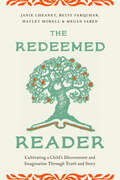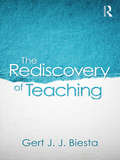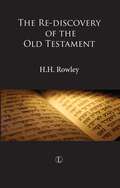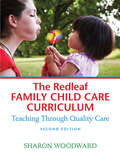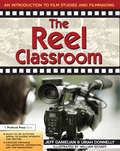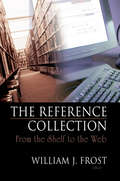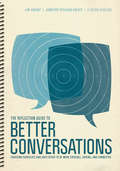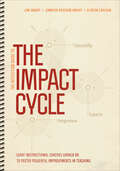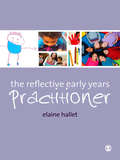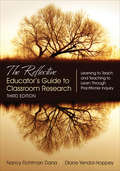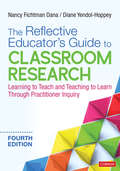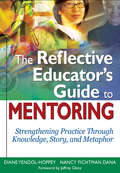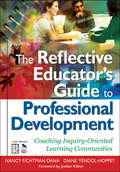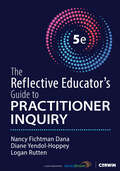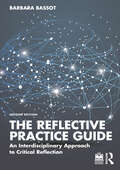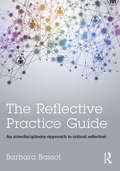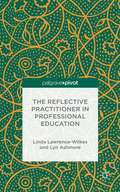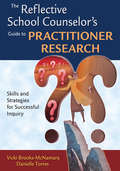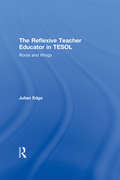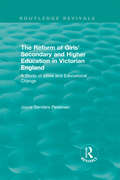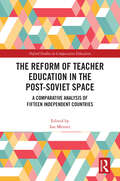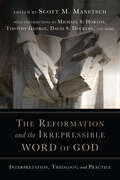- Table View
- List View
The Redeemed Reader: Cultivating a Child's Discernment and Imagination Through Truth and Story
by Janie Cheaney Betsy Farquhar Hayley Morell Megan SabenA book, too, can be a star, a living fire to lighten the darkness, leading out into the expanding universe. —Madeleine L'EngleGod loves stories. We understand the world and ourselves in light of His great story. And humans reflect Him in their love to tell and immerse themselves in story. But not all stories are equal—or even good.Good books awaken us to truth, warn us from falsehood, and provide unforgettable examples. They open our hearts to beauty and wonder. They shape us. In The Redeemed Reader, parents and educators find encouragement and guidance to raise readers who can engage both heart and mind with books and the culture surrounding them.This book offers insight into how to build discernment in children and provides practical tips, examples, and booklists for their literary journey. Passionate about shepherding imaginations and young hearts, the authors read ahead so that you can confidently choose books for your children.Readers will discover a deeper understanding of how the gospel shines into children&’s books and practical guidance for applying these principles. If you want the imaginations of your children to be formed by what is good and true, The Redeemed Reader will equip you—parents, librarians, and educators—to navigate literary culture in a fallen world and to nurture thoughtful readers.
The Rediscovery of Teaching
by Gert J. BiestaThe Rediscovery of Teaching presents the innovative claim that teaching does not necessarily have to be perceived as an act of control but can be understood and configured as a way of activating possibilities for students to exist as subjects. By framing teaching as an act of dissensus, that is, as an interruption of egological ways of being, this book positions teaching at the progressive end of the educational spectrum, where it can be reconnected with the emancipatory ambitions of education. In conversation with the works of Emmanuel Levinas, Paulo Freire, Jacques Rancière, and other theorists, Gert Biesta shows how students’ existence as subjects hinges on the creation of existential possibilities, through which students can assert their "grown-up" place in the world. Written for researchers and students in the areas of philosophy of education, educational theory, curriculum theory, teaching, and teacher education, The Rediscovery of Teaching demonstrates the important role of teachers and teaching in the project of education as emancipation towards grown-up ways of being in the world.
The Rediscovery of the Old Testament
by H H RowleyA reprint of a classic exposition of the understanding of the Old Testament. Rowley brings the Old Testament back to the forefront of Scholarship and finds rich meaning in much of what has previously been buried. Increasingly men are turning their thoughts to the deeper message of the Old Testament, and finding richer meaning in the light of all work that has been done. The Old Testament need not to be buried beneath the weight of scholarship, but may rather stand on the foundation of scholarship, sustained by it and firmly upheld before men - from the Preface.
The Redleaf Family Child Care Curriculum
by Sharon WoodwardThis leading resource is a specifically designed curriculum for family child-care providers. They will be able to incorporate best practices and activities appropriate for the mixed ages of children in their care. Developmental domains and milestones, learning areas, age-appropriate activities and outcomes, and more are included. It is far more affordable than other family child care curriculum alternatives, and it aligns with Quality Rating and Improvement System (QRIS) requirements around the country.Sharon Woodward is the author of several resources for family child-care providers and holds a degree in social work.
The Reel Classroom: An Introduction to Film Studies and Filmmaking (Grades 6-9)
by Jeff DanielianThe Reel Classroom: An Introduction to Film Studies and Filmmaking presents an educator-facilitated curriculum that focuses on a variety of aspects concerning the appreciation of film and the filmmaking process. With a goal to turn "movie day" into a teaching and learning opportunity—rather than a virtual day off for students—this book will help invigorate classrooms of all disciplines by incorporating documentaries, feature films, short films, and animated films into the regular curriculum. Chapters begin with short and effective introductions to the specified concept with accompanying class discussion ideas and background information for the teacher. Each chapter will conclude with reproducible handouts and assignment sheets along with two to three sample activities/opportunities for assessment. Suggestions for films to be used for each discipline will also be given.Grades 6-9
The Reference Collection: From the Shelf to the Web
by Linda S KatzStay up-to-date with the growing amount of reference resources available onlineHow important is the World Wide Web to information retrieval and communication? Important enough that information professionals have seen students exit from their libraries en masse when Internet service was lost. Internet providers dominate the indexing and abstracting of periodical articles as major publishers now offer nearly all of their reference titles in digital form. Libraries spend increasing amounts of funding on electronic reference materials, and librarians devote an increasing amount of time to assisting in their use. The Reference Collection: From the Shelf to the Web is an essential guide to collection development for electronic materials in academic and public libraries. The Reference Collection: From the Shelf to the Web tracks the continuing evolution of electronic reference resources-and how they&’re accessed-in a variety of settings. Librarians representing university, elementary school, and public libraries in the United States and Australia examine how reference collections have evolved over time (and may soon be a thing of the past); how public and school libraries have dealt with the changes; why library research assignments have become more difficult for teachers to make and for students to complete; how to organize online reference sources; and why the nature of plagiarism has changed in the electronic era. The book also examines the use of electronic references from a publisher&’s perspective and looks at the most important Web-accessible reference tools-both free and subscription-in the areas of humanities, medicine, the social sciences, business, and education. The Reference Collection: From the Shelf to the Web also examines: issues of authority, accessibility, cost, comfort, and user education in evaluating electronic resources the formation of purchasing consortia to facilitate the transfer of reference materials from print to online formats current literature and research findings on the state of digital versus print reference collections what electronic publishing means to smaller reference books (dictionaries, almanacs, etc.) the need for increased information literacy among students the nature, extent, and causes of cyber plagiarism the use of federated search tools and includes a selected list of the top 100 free Internet reference sitesThe Reference Collection: From the Shelf to the Web is an essential resource for all reference and collection development librarians, and an invaluable aid for publishing professionals.
The Reflection Guide to Better Conversations: Coaching Ourselves and Each Other to Be More Credible, Caring, and Connected (20160101 #05 College/higher education)
by Jim KnightEvery worthwhile book has a deeply held belief, and for Jim Knight’s Better Conversations and this worktext, The Reflection Guide to Better Conversations, here it is: “Effective communication is an essential skill for a fulfilled life, and we can’t teach it to students if we don’t know how to do it ourselves.” Instructional coaches, administrators, teachers . . . really everyone: the royal we is you. In this Reflection Guide, Jim delivers a framework for improving professional dialogue that is so clearly signposted, you might as well call it a day planner. Here’s how The Reflection Guide to Better Conversations works: In Part One, you and your peers engage in surveys, take stock, and record video in order to get real about your current beliefs and abilities. How do you measure up when it comes to empathy, asking better questions? Finding common ground? In Part Two, learn about the 10 habits of being an effective communicator, and put them into practice. Are your conversations focused on others 50 percent of the time? What things typically distract you from being fully present? In Better Conversations, Jim Knight reveals why true dialogue improves professional performance, job satisfaction, and classroom instruction. Together with this Reflection Guide, the two books provide a brilliant, scaffolded professional learning experience on a topic central to learning, central to life. This is the district-wide solution you need—are you ready?
The Reflection Guide to The Impact Cycle: What Instructional Coaches Should Do to Foster Powerful Improvements in Teaching
by Jim Knight Jennifer Ryschon Knight Clinton Carlson"Jim Knight is one of the wise men of coaching. His well is deep; he draws from it the best tools from practitioners, the wisdom of experience, and research-based insights. And he never loses sight of the bigger picture: the point of all this is to have more impact in this life we′re lucky enough to live." —MICHAEL BUNGAY STANIER, Author of The Coaching Habit Every decade or so a book comes along that has such a profound impact on professional practice that it launches a movement. Such was the case ten years ago with Jim Knight’s Instructional Coaching. Now, it’s about to happen again with The Impact Cycle and this The Reflection Guide to The Impact Cycle, in which Jim shares his latest thinking, and advances an all-new instructional coaching cycle to help teachers and, in turn, their students improve in clear, measurable ways. What makes this Reflection Guide the perfect companion to The Impact Cycle? Because it functions almost like a daily planner for reaching, even exceeding, your coaching goals. Jam-packed with key concepts, prompts, and exercises, this guide will prove indispensable to Coaches who wish to accelerate progress toward goals and move their practices forward Leaders of coaches looking for a simple, effective model to get all stakeholders on the same page Join the hundreds of thousands of educators who already have benefited from Jim’s ground-breaking work. Read The Impact Cycle, build upon your expertise with this companion Reflection Guide, and soon enough you, too, will experience the next "Jim Knight phenomenon." View Jim Knight’s Impact Cycle video trailer:
The Reflection Guide to The Impact Cycle: What Instructional Coaches Should Do to Foster Powerful Improvements in Teaching
by Jim Knight Jennifer Ryschon Knight Clinton Carlson"Jim Knight is one of the wise men of coaching. His well is deep; he draws from it the best tools from practitioners, the wisdom of experience, and research-based insights. And he never loses sight of the bigger picture: the point of all this is to have more impact in this life we′re lucky enough to live." —MICHAEL BUNGAY STANIER, Author of The Coaching Habit Every decade or so a book comes along that has such a profound impact on professional practice that it launches a movement. Such was the case ten years ago with Jim Knight’s Instructional Coaching. Now, it’s about to happen again with The Impact Cycle and this The Reflection Guide to The Impact Cycle, in which Jim shares his latest thinking, and advances an all-new instructional coaching cycle to help teachers and, in turn, their students improve in clear, measurable ways. What makes this Reflection Guide the perfect companion to The Impact Cycle? Because it functions almost like a daily planner for reaching, even exceeding, your coaching goals. Jam-packed with key concepts, prompts, and exercises, this guide will prove indispensable to Coaches who wish to accelerate progress toward goals and move their practices forward Leaders of coaches looking for a simple, effective model to get all stakeholders on the same page Join the hundreds of thousands of educators who already have benefited from Jim’s ground-breaking work. Read The Impact Cycle, build upon your expertise with this companion Reflection Guide, and soon enough you, too, will experience the next "Jim Knight phenomenon." View Jim Knight’s Impact Cycle video trailer:
The Reflective Early Years Practitioner
by Elaine HalletShortlisted for the 2013 Nursery World Awards! 'The author offers opportunity to reflect upon experience and brings together reflective practice and work-based learning, aiming to support the professional growth of a reflective early years workforce' -Karen Ward, Senior Lecturer in Early Years, Birmingham City University Work-based reflective learning is a key part of the professional development of practitioners working in the early years sector. The Reflective Early Years Practitioner focuses on the practitioner's role and development within a wide range of contexts in this area. Informed by empirical research, packed with case studies from a wide range of settings and with points for reflection in each chapter, the author covers: - developing as an early years practitioner - reflective vocational progression - pedagogical examples for continuing professional development - study skills to begin reflective practice - professionalism and reflective leadership in the early years Vital aspects of practice, such as assessing and planning for children's learning, developing inclusive teaching strategies and integrated practice are highlighted within the chapters. This is essential reading for students undertaking work-based and academic study in early years and for those working towards post-graduate and professional qualifications. It provides readers with tools to continually practice work-based reflective learning now and in the future.
The Reflective Educator's Guide to Classroom Research: Learning to Teach and Teaching to Learn Through Practitioner Inquiry
by Nancy Fichtman Dana Diane Yendol-HoppeyHarness the power of classroom data with the bestselling, updated guide to professional learning through inquiry and analysis. In this third edition of the renowned approach to teacher inquiry and data analysis, the authors add forward-thinking substance to their methods of formulating action research questions, collecting and analyzing data, and creating lasting solutions. In addition to illustrative real-life examples and practical exercises, new features include: An expanded data analysis chapter that introduces formative data analysis and its role in teacher research. Techniques for using inquiry to effectively implement Common Core State Standards. A brand-new chapter on ethical issues in teacher research.
The Reflective Educator's Guide to Classroom Research: Learning to Teach and Teaching to Learn Through Practitioner Inquiry
by Nancy Fichtman Dana Diane Yendol-HoppeyFor three editions, teacher preparation and professional development providers have turned to this bestselling how-to guide for its authentic approach to teacher inquiry and how to harness it for the greatest transformational effect. In this edition, readers explore contemporary as well as enduring real-life examples of data-driven classrooms. Featuring helpful exercises and step-by-step instructions, this edition explores: • equity and social justice and the role inquiry plays in tackling it • professional practice doctoral programs as ripe context for inquiry • the role literature plays in teacher research
The Reflective Educator's Guide to Classroom Research: Learning to Teach and Teaching to Learn Through Practitioner Inquiry
by Nancy Fichtman Dana Diane Yendol-HoppeyFor three editions, teacher preparation and professional development providers have turned to this bestselling how-to guide for its authentic approach to teacher inquiry and how to harness it for the greatest transformational effect. In this edition, readers explore contemporary as well as enduring real-life examples of data-driven classrooms. Featuring helpful exercises and step-by-step instructions, this edition explores: • equity and social justice and the role inquiry plays in tackling it • professional practice doctoral programs as ripe context for inquiry • the role literature plays in teacher research
The Reflective Educator’s Guide to Mentoring: Strengthening Practice Through Knowledge, Story, and Metaphor
by Nancy Fichtman Dana Diane Yendol-HoppeyMentors will discover strategies for meeting the diverse needs of their mentor/mentee relationships, developing useful mentoring tools, and continuing to learn and grow professionally.
The Reflective Educator’s Guide to Professional Development: Coaching Inquiry-Oriented Learning Communities
by Nancy Fichtman Dana Diane Yendol-HoppeyPowerful tools for facilitating teachers' professional development and optimizing school improvement efforts! Combining professional learning communities (PLCs) and action research, this step-by-step guide provides coaches, workshop leaders, and staff developers with strategies, activities, and tools to develop inquiry-oriented PLCs. The authors present essential elements of a healthy PLC, case studies of inquiry-based PLCs, and lessons learned for improving coaching practices. Sample projects and reflection prompts will help readers: Organize, assess, and maintain high-functioning, inquiry-oriented PLCs Facilitate the development of study questions Enable PLC members to develop, analyze, and share research results Lead successful renewal and reform efforts
The Reflective Educator′s Guide to Practitioner Inquiry
by Diane Yendol-Hoppey Nancy Fichtman Dana Logan RuttenTransform your teaching and shape education through the power of inquiry. Grounded in real-world examples and more than 30 years of research in professional development, the fifth edition of The Reflective Educator′s Guide to Practitioner Inquiry addresses how inquiry fosters curiosity, reflection, and practical action to enhance effective classroom learning. This latest edition invites educators to view inquiry as a process, a product, and a stance. The book offers new sections on the relationship between AI and teacher inquiry and the ways in which inquiry is changing with the times. Additional features and updates include: A new chapter that provides a step-by-step guide to crafting an intentional, actionable research plan Access exercises, inductive and deductive data analysis worksheets, ethical guidelines, and examples addressing today’s issues in education A discussion of the connections between practitioner inquiry and supporting the academic success of every student The Reflective Educator’s Guide to Practitioner Inquiry, fifth edition, empowers educators at every stage in their careers to investigate their practice, drive sustained professional growth, and harness inquiry’s potential to create classrooms where both students and teachers thrive.
The Reflective Educator′s Guide to Practitioner Inquiry
by Diane Yendol-Hoppey Nancy Fichtman Dana Logan RuttenTransform your teaching and shape education through the power of inquiry. Grounded in real-world examples and more than 30 years of research in professional development, the fifth edition of The Reflective Educator′s Guide to Practitioner Inquiry addresses how inquiry fosters curiosity, reflection, and practical action to enhance effective classroom learning. This latest edition invites educators to view inquiry as a process, a product, and a stance. The book offers new sections on the relationship between AI and teacher inquiry and the ways in which inquiry is changing with the times. Additional features and updates include: A new chapter that provides a step-by-step guide to crafting an intentional, actionable research plan Access exercises, inductive and deductive data analysis worksheets, ethical guidelines, and examples addressing today’s issues in education A discussion of the connections between practitioner inquiry and supporting the academic success of every student The Reflective Educator’s Guide to Practitioner Inquiry, fifth edition, empowers educators at every stage in their careers to investigate their practice, drive sustained professional growth, and harness inquiry’s potential to create classrooms where both students and teachers thrive.
The Reflective Practice Guide: An Interdisciplinary Approach to Critical Reflection
by Barbara BassotThe Reflective Practice Guide offers an accessible introduction to engaging effectively in critical reflection, supporting all students in their development of the knowledge and skills needed to enhance their professional practice. This second edition has been thoroughly updated with new chapters emphasising the importance of personal growth, processing emotions, building resilience, and issues of diversity, intersectionality and positionality. Throughout the book Barbara Bassot illustrates the process of critical reflection using examples and case studies drawn from a range of professional contexts, offering an interdisciplinary model of practice that may be applied to many settings. Drawing on literature from a range of disciplines, chapters explore the key aspects of reflection, including: Developing self-awareness The role of writing in reflection Reflecting with others The importance of emotions and processing feelings Managing change Learning from experiences Self-care and avoiding burnout The book is extended and enhanced through Instructor and Student Resources that include additional content including case studies, reflective activities, diagrams and videos. These can be found at www.routledge.com/cw/bassot. This essential text offers support, guidance and inspiration for all students in the helping professions including education, health, social care and counselling, who want to gain greater self-awareness, challenge assumptions and think about practice on a deeper level.
The Reflective Practice Guide: An interdisciplinary approach to critical reflection
by Barbara BassotThe Reflective Practice Guide supports all students for whom the process of reflecting on developing knowledge and skills is crucial to successful professional practice. It offers an accessible introduction to a wide range of theories and models that can help you engage more effectively in critical reflection. Illustrated throughout with examples and case studies drawn from a range of interdisciplinary professional contexts, The Reflective Practice Guide offers models of practice that can be applied in a variety of settings. Reflective questions in each chapter help you apply ideas to your own professional context. Drawing on literature from a range of disciplines, key aspects of reflection explored include: Becoming more self-aware The role of writing in reflection Learning from experience Learning from positives and negatives Emotions and processing feelings Bringing assumptions to the surface Learning from feedback Reflecting in groups Managing change. The Reflective Practice Guide is an essential source of support, guidance and inspiration for all students on education, nursing, social work and counselling courses, who want to think about practice at a deeper level, question approaches, challenge assumptions and gain greater self-awareness.
The Reflective Practitioner in Professional Education
by Lyn Ashmore Linda Lawrence-WilkesHow important is it to be a reflective practitioner in education today? This book examines the reflective practitioner role and the scope of reflective activities in professional practice, revealing that critical thinking is rooted in a philosophical debate about notions of truth linked to differing learning approaches.
The Reflective School Counselor's Guide to Practitioner Research: Skills and Strategies for Successful Inquiry
by Vicki Brooks-Mcnamara Danielle TorresProvides a step-by-step process for conducting practitioner inquiry projects by collecting, analyzing, and using data, and offers guidelines for developing counselors' advocacy, leadership, and collaboration skills.
The Reflexive Teacher Educator in TESOL: Roots and Wings
by Julian EdgeIn this book Julian Edge explores the construct of reflexivity in teacher education, differentiating it from, while locating it in, reflective practice. Reflexivity is the key concept underpinning a view of teacher education that binds together the orientations of action research and personal development in a way that establishes common ground, common purpose, and common experience between teachers and teacher educators. Augmenting the field in important ways, The Reflexive Teacher Educator in TESOL: develops the concept of praxis as it resolves the usual theory/practice dichotomy of teacher education introduces a framework (Copying, Applying, Theorising, Reflecting, Acting) that allows present and prospective teacher educators to become reflexive individuals uses a narrative, autobiographical voice that explicates the concepts involved, while also offering practical methodological procedures for teacher education. Written with clarity and style, scholarly yet personal, dealing with reflexivity in an accessible yet non-trivial way, this book – a first in the field, distinctive in terms of what the story is and how it is told – is a gift to the profession of TESOL teacher education.
The Reform of Girls' Secondary and Higher Education in Victorian England: A Study of Elites and Educational Change (Routledge Revivals)
by Joyce Senders PedersenOriginally published in 1987, this title was first submitted as a doctoral dissertation at the University of California, Berkeley in 1974. Completed just as the years of expansion in higher education were drawing to a close, it reflects the growing doubts of the period as to the ability of formal education provision alone to effect major changes in the distribution of socio-economic privilege at the group level, whether as between the sexes, classes, or ethnic groups. Reforms in women’s education had traditionally been dealt with as a small part of the women’s emancipation movement. This book approaches the education reforms in a different way and begins with the question of which social groups participated in the movement. Seen from this point of view, a primary interest of the reforms is the function they served in promoting a redefinition of the status and roles of a social elite.
The Reform of Teacher Education in the Post-Soviet Space: A Comparative Analysis of Fifteen Independent Countries (Oxford Studies in Comparative Education)
by Ian MenterThis book draws on scholarly expertise across the former Soviet Union to provide a comparative analysis of the policies and practices that are discussed within the context of global reform of teacher education.Divided into three parts, chapters of this book discuss the context behind economic and political reform across the former Soviet Union, and the resulting change that has occurred within teacher education systems within the 15 republics that now exist in this ‘post- Soviet space’. Offering a complex and nuanced account of ‘vernacular globalisation’, the book discusses the significant contribution that teacher education can make to the process of nationbuilding. In doing so, this truly international volume offers fresh insights and original perspectives on this dynamic educational landscape.Being the first comprehensive account of reforms in all 15 nations that emerged in the post- Soviet world, this book will be of interest to students, scholars, and academics in the fields of teacher education, international, and comparative education, and education policy and politics. It should also be of relevance to teacher educators and policymakers around the world more broadly.
The Reformation and the Irrepressible Word of God: Interpretation, Theology, and Practice
by Scott M. ManetschAccording to Scripture, the Word of God is "living and active" (Heb 4:12). That affirmation was embraced by the Protestant Reformers, whose understanding of the Christian faith and the church was transformed by their encounter with Scripture. It is also true of the essays found in this volume, which brings together the reflections of church historians and theologians originally delivered at Trinity Evangelical Divinity School on the occasion of the 500th anniversary of the Reformation. As they consider historical, hermeneutical, theological, and practical issues regarding the Bible, these essays reveal that the irrepressible Word of God continues to transform hearts and minds.
